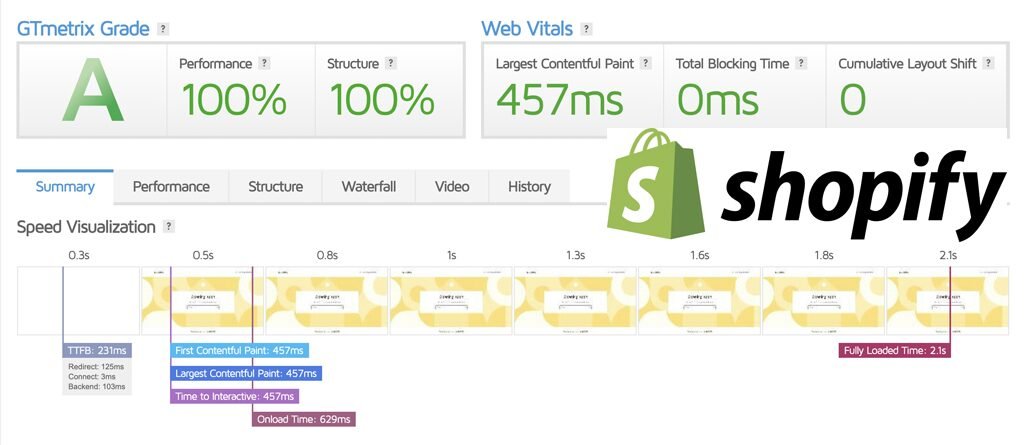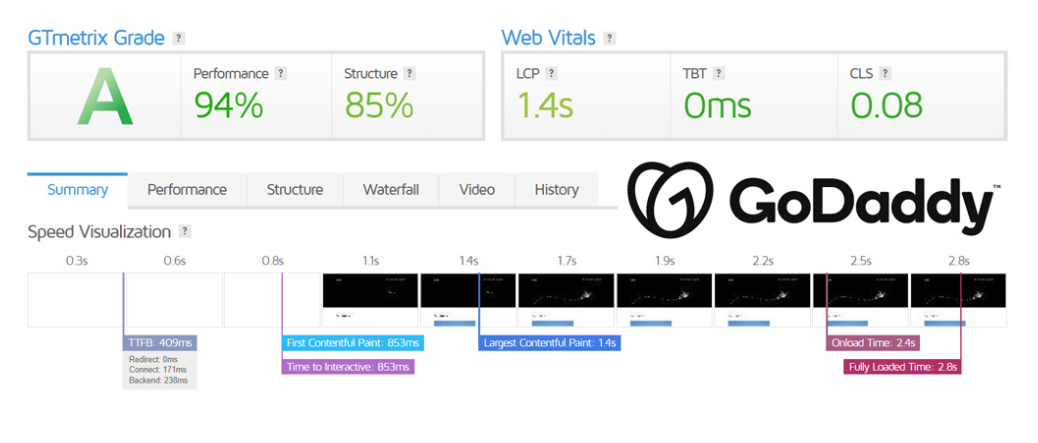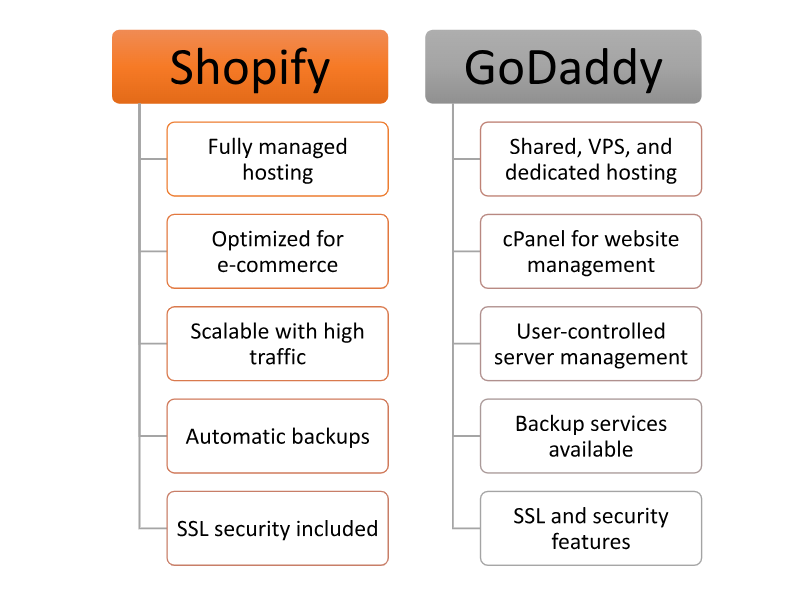Shopify vs GoDaddy – “Best for E-Commerce…”
Shopify and GoDaddy cater to different needs. Shopify is a dedicated e-commerce platform with tools for online stores, while GoDaddy focuses on domains, hosting, and website building, suitable for general websites or small-scale stores.
Shopify excels in advanced e-commerce features like integrations, inventory management, and analytics, ideal for growing businesses. GoDaddy offers simplicity, easy templates, and quick setup, perfect for beginners or basic websites.
Pricing models also differ between the two. Shopify is subscription-based, with tiered plans offering more features as the cost increases. GoDaddy has more flexible options, with pricing varying based on the services selected, such as domain registration, hosting, or e-commerce tools. Choosing between the two depends on whether your focus is purely on e-commerce or a more general website presence.
Shopify
Performance: |5.0|
Shopify delivers excellent performance for e-commerce with fast loading times, reliable uptime, and scalability to handle high traffic. Its optimized infrastructure ensures smooth operations for online stores, even during sales or peak seasons. Integrated tools streamline transactions and customer experience.
Uptime: |4.9|
Shopify offers reliable uptime, ensuring online stores remain accessible to customers, even during high-traffic periods. Its robust infrastructure minimizes downtime, supporting seamless shopping experiences.
Customer Service: |4.8|
Shopify offers 24/7 customer support via chat, email, and phone, ensuring quick help for users worldwide. Its support team specializes in e-commerce, providing tailored guidance for online store issues and troubleshooting technical challenges effectively.
GoDaddy
Performance: |4.8|
GoDaddy offers solid performance for general websites, with fast hosting speeds and decent uptime. While it supports small e-commerce setups, it’s better suited for less demanding sites. Its simplicity and ease of use make it a good choice for small businesses and personal websites.
Uptime: |4.9|
GoDaddy also provides good uptime for websites, making it dependable for general use. While suitable for basic e-commerce, its uptime performance is less tailored for high-demand online stores compared to Shopify.
Customer Service: |4.7|
GoDaddy also provides 24/7 support, focusing on general website and hosting needs. It offers phone and chat assistance, with an easy-to-navigate help center for common queries, making it ideal for beginners seeking straightforward solutions.
Both platforms have extensive knowledge bases and community forums. Shopify’s support excels for e-commerce-specific problems, while GoDaddy’s is more versatile for broader website needs, catering to diverse customer requirements.
Overall Comparison Shopify vs GoDaddy
| Aspect | Shopify | GoDaddy |
|---|---|---|
| Primary Use | E-commerce platform for online stores | Website builder for general use |
| Ease of Use | Moderate, designed for scalability | Beginner-friendly, simple interface |
| Customization | Extensive with themes and apps | Limited customization options |
| Performance | Optimized for high-traffic e-commerce | Reliable for basic websites |
| Customer Support | 24/7, e-commerce-focused assistance | 24/7, general website support |
| Pricing | Subscription-based, tiered plans | Flexible pricing based on services |
| Best For | Medium to large online businesses | Small businesses and personal sites |
1. Plans and Pricing
Shopify offers three primary pricing plans, detailed below with their monthly costs when billed annually
Basic: $29 per month
Shopify: $79 per month
Advanced: $299 per month
Although Shopify does not have a free plan, it provides a three-day free trial, after which you can opt for the Basic plan at $1 for the first month. Additionally, there is a budget-friendly Starter plan for $5 per month, which is designed for social media use. Unlike the other plans, the Starter plan does not include a full website; instead, it offers product links that can be shared in social media posts or messages.
| Plan Type | Shopify | GoDaddy |
|---|---|---|
| Pricing Structure | Subscription-based, tiered plans th | Flexible pricing based on services |
| Lowest Plan | Starter plan at $39/month | Basic plan at $6.99/month |
| Mid-Tier Plan | Basic plan at $39/month | Standard plan at $14.99/month |
| Highest Plan | Advanced plan at $399/month | Ultimate plan at $19.99/month |
| Additional Costs | Transaction fees, apps, themes | Domain registration, add-ons |
GoDaddy offers a single comprehensive Ecommerce plan for $20.99 per month when billed annually. While the $14.99 per month Premium plan allows payment acceptance for appointments, selling products requires upgrading to the Ecommerce plan.
If you’re looking to explore GoDaddy, its free plan is a good starting point for refining your site’s design. However, staying on the free plan isn’t ideal, as it includes ads on your site, does not support custom domains, and prevents payment acceptance until you upgrade.
Hosting Management
| Aspect | Shopify | GoDaddy |
|---|---|---|
| Hosting Type | Fully managed hosting for e-commerce | Shared, VPS, and dedicated hosting |
| Control Panel | Easy-to-use admin panel for stores | cPanel for website management |
| Server Management | Handled entirely by Shopify | Advanced plan at $399/month |
| Scalability | Scalable for high traffic | Scalable with VPS or dedicated plans |
| Security | SSL certificates, secure payments | SSL, DDoS protection, and backups |
| Backups | Automatic backups provided | Backup services are add-ons |
| Uptime Guarantee | 99.98% uptime guarantee | 99.9% uptime guarantee |
| Performance Optimization | Built-in tools for speed and SEO | Optimization options for website speed |
2. Features
Shopify Provides More Premium Features and Extra Freebies
Shopify stands out as the top-rated ecommerce platform in our research, thanks to its exceptional sales features. With the ability to sell unlimited products, Shopify lets merchants organize their stores freely, offer discounts and sales, and create eye-catching promotional pop-ups. For those unsure where to start, Shopify includes an ecommerce checklist to guide you through the setup process.
Selling is made simple with Shopify, but what about delivering products to customers? Shopify Shipping streamlines the process by partnering with major shipping providers such as USPS, DHL Express, UPS, and Canada Post. U.S.-based users can even print custom shipping labels, adding a personal touch to their packages.
| Shopify | GoDaddy |
|---|---|
| Focused on e-commerce. | General website builder. |
| Supports multiple sales channels. | Limited e-commerce features. |
| Advanced analytics and reports. | Basic performance tracking. |
| Customizable online store themes. | Pre-built templates. |
| Extensive app integrations. | Limited third-party apps. |
| Secure payment gateways. | Basic payment options. |
| Designed for scalability. | Suited for smaller websites. |
Unlike Shopify, GoDaddy does not have an app store, so you’ll need to rely on its built-in sales features for your online store. While GoDaddy does allow you to sell unlimited products, its sales features don’t match Shopify’s depth. For instance, Shopify offers detailed reports and analytics on customer behavior, a functionality that GoDaddy lacks.
GoDaddy excels in leveraging AI to support small businesses. Its newly introduced AI tool, GoDaddy Airo, is specifically designed to help small businesses establish themselves. With AI, users can create ads, send abandoned cart recovery emails, design logos, and even respond to customer inquiries.
Although Shopify outshines GoDaddy in product management, GoDaddy’s robust marketing tools make it an excellent choice for small online stores.
3. Performance
Shopify vs. GoDaddy: Website Speed and Performance
When it comes to website speed and performance, Shopify is the clear leader. Our testing revealed that Shopify outperformed GoDaddy with faster page loading times and superior core web vitals. While the speed of an ecommerce site can partly depend on the number of products you sell, Shopify’s flawless 100% scores in performance and structure highlight its potential to support online stores of any size.
Below are our sample speed test results from GTmetrix:
Page Performance of Shopify

Page Performance of GoDaddy

4. Ease of Use
Shopify
User-Friendly Interface: Shopify’s admin panel is simple to navigate, making it easy for users to manage their online store without technical expertise.
Quick Setup: Setting up an online store takes only a few steps, thanks to its intuitive interface and step-by-step guides.
Customization Options: Despite its simplicity, Shopify allows for extensive customization with themes and apps, ideal for both beginners and experienced users.
Built-In E-Commerce Features: Shopify comes with many essential e-commerce tools like payment gateways, shipping integrations, and product management already built in.
GoDaddy
Beginner-Friendly: GoDaddy’s website builder is designed for people with no technical background, offering drag-and-drop functionality.
Simple Interface: The platform uses an easy-to-navigate dashboard for managing domains, hosting, and website content.
Pre-Designed Templates: GoDaddy provides a variety of ready-made templates, allowing users to create a website quickly without design skills.
Guided Setup: It offers guided instructions during the setup process, making it easy to launch a website with minimal effort.
Hosting Provided

What Our Customers Have to Say?
Shopify
Ease of Use: Customers appreciate Shopify’s intuitive interface and how quickly they can set up and manage their online stores.
Customer Support: Users often highlight the responsive and knowledgeable customer service, especially for e-commerce-related queries.
Customization: Many customers praise the wide range of themes and apps, allowing for personalized online stores.
Reliability: Shopify’s stable hosting and minimal downtime are frequently mentioned, ensuring smooth operation even during high traffic.
Payment Solutions: Customers love the multiple payment gateways and easy integration with payment processors.
GoDaddy
Ease of Use: Customers find GoDaddy’s website builder easy to use, especially for those with no technical experience.
Customer Support: Reviews mention GoDaddy’s support team is helpful, but some feel it’s more general compared to e-commerce-focused platforms.
Affordability: Many customers appreciate GoDaddy’s flexible pricing and budget-friendly options for basic websites.
Website Speed: Users report decent website performance, though some advanced users seek better speed optimization options.
Domain Management: GoDaddy is often praised for its straightforward domain registration and management services.
Advantage of Shopify vs GoDaddy
| Shopify | GoDaddy |
|---|---|
| Easy to set up and manage e-commerce stores | Ideal for beginners and personal websites |
| Wide range of customizable themes and apps | Affordable pricing options for small sites |
| Scalable for growing businesses | Flexible hosting solutions (shared, VPS, dedicated) |
| Built-in tools for payments and shipping | Simple website builder with drag-and-drop functionality |
| 24/7 customer support focused on e-commerce | Excellent domain registration and management services |
| Secure, reliable hosting with automatic backups | Basic hosting with the option to upgrade plans |
| Integrations with various sales channels | Easy-to-navigate cPanel for website management |
| High uptime and performance for online stores | Quick setup for basic websites and blogs |
Disadvantage of Shopify vs GoDaddy
| Shopify | GoDaddy |
|---|---|
| Higher monthly fees for advanced plans | Limited e-commerce features for growth |
| Transaction fees on third-party gateways | Less flexibility in customization options |
| Limited design flexibility in lower plans | Some advanced tools are add-ons |
| No free plan, only trial available | Basic hosting not as optimized for e-commerce |
| Requires apps for advanced functionality | Limited scalability for large sites |
| Limited to Shopify ecosystem for apps | Can be complicated for advanced users |
5. Support
Shopify vs. GoDaddy: Customer Support
Both Shopify and GoDaddy provide live chat support, but the quality varies. GoDaddy’s support can be inconsistent—sometimes adequate, but at other times less responsive or even unavailable.
In contrast, Shopify’s live chat support stands out for being helpful and courteous. Beyond its automated bot, you can quickly connect with a live support agent. Although the estimated wait time is around 5 minutes, it often takes less. Shopify’s support team is consistently knowledgeable and provides prompt solutions. Additionally, chat sessions are automatically logged, giving you easy access to recorded transcripts for future reference.
Shopify
24/7 Availability: Support is available around the clock through live chat, email, and phone.
E-Commerce Expertise: The team specializes in e-commerce-related issues, providing tailored guidance for store management.
Multilingual Support: Available in multiple languages to assist customers worldwide.
Comprehensive Help Center: Offers detailed guides, FAQs, and tutorials for users to find answers quickly.
Community Forums: A strong online community where users can share tips, ask questions, and discuss solutions.
GoDaddy
24/7 Availability: Offers 24/7 support via phone and chat to address technical and general queries.
General Website Focus: Primarily supports website hosting, domain management, and email-related inquiries.
Help Center & Knowledge Base: A vast collection of articles and tutorials to help users solve issues independently.
Email Support: Email support is available but may have longer response times compared to live chat.
Limited E-Commerce Focus: Not as specialized for e-commerce issues compared to Shopify’s support.
6. Security
Shopify vs GoDaddy: Security and Compression
Shopify and GoDaddy prioritize security, but their approaches differ slightly, especially regarding data compression for performance.
Shopify automatically optimizes and compresses site assets like images and scripts to ensure faster load times without compromising security. This optimization helps maintain excellent website performance while reducing vulnerabilities linked to slow-loading pages. Shopify also includes robust security measures, such as PCI compliance, SSL certificates, and regular updates, providing a secure environment for ecommerce transactions.
GoDaddy also supports compression through its hosting infrastructure, enabling faster website performance by optimizing assets like images and files. However, the depth of optimization isn’t as extensive as Shopify’s integrated systems. GoDaddy focuses on fundamental security features, including SSL certificates and malware scanning, but its emphasis leans more toward small business websites, which might need fewer advanced security and compression tools than Shopify offers.
| Security Feature | Shopify | GoDaddy |
|---|---|---|
| SSL Certificates | Included with all plans | Available with all hosting plans |
| Two-Factor Authentication | Available for account security | Available for account security |
| PCI Compliance | Fully PCI DSS compliant for payments | PCI DSS compliance for payment gateways |
| Fraud Protection | Advanced fraud analysis and protection | Basic fraud protection on payment gateways |
| Backup Protection | Automatic backups included | Backup services available as add-ons |
| DDoS Protection | Built-in DDoS protection | Available with higher-tier plans |
| Firewalls | Managed firewalls for data protection | Built-in firewalls for websites and servers |
| Data Encryption | End-to-end encryption for transactions | Data encryption available with SSL |
Overall, Shopify’s seamless blend of compression and advanced security gives it an edge, particularly for high-performing ecommerce stores.
Final Recommendations
| Criteria | Shopify | GoDaddy |
|---|---|---|
| Best For | Medium to large online stores | Small websites or personal blogs |
| Ease of Use | User-friendly but may require learning for advanced features | Very easy to use, ideal for beginners |
| Customer Support | 24/7, highly specialized for e-commerce | 24/7, general support for websites |
| Scalability | Excellent scalability for growth | Limited scalability for larger sites |
| Customization | Highly customizable with themes and apps | Limited customization options |
| Pricing | Higher monthly fees, but includes e-commerce tools | More affordable, but extra features may cost more |
| Security | Strong security features including fraud protection and SSL | Basic security features, SSL included |
| Performance | Optimized for e-commerce with fast loading times | Good for general websites, but not as optimized for high-traffic stores |
Frequently Asked Questions
- Shopify is an e-commerce platform designed to help businesses create and manage online stores. It provides tools for inventory management, payment processing, and marketing.
- Shopify offers several pricing plans starting at $39/month. Higher plans provide more features, with costs increasing based on the tools and services required.
- Yes, you can use your own domain with Shopify by either transferring it or connecting an existing one.
- Yes, Shopify offers a 3-day free trial for new users to explore the platform before committing to a paid plan.
- Yes, GoDaddy offers a website builder with easy-to-use tools to create websites, blogs, and small online stores.
- GoDaddy provides basic e-commerce tools, but for more advanced features and scalability, Shopify is a better option.
- GoDaddy offers flexible pricing, starting at $6.99/month for basic hosting and website builder plans. Additional features like domain registration and SSL cost extra.
- Yes, GoDaddy offers 24/7 customer support via phone, chat, and email for general website and hosting inquiries.
- Yes, GoDaddy allows users to upgrade from basic hosting to VPS or dedicated servers as their website grows.
- Shopify offers fully managed hosting optimized for e-commerce, with automatic backups, SSL, and built-in security features.
- Yes, GoDaddy offers a limited selection of apps and integrations, but it’s not as extensive as Shopify’s app marketplace.
- Shopify provides top-tier security, including SSL certificates, fraud protection, and PCI compliance for handling customer payments securely.
Visit Link
Quick Link
Contact Us
Jhansala, Punjab – 140601
info@comparexpert.in
+91 85790 13995
© 2024 comparexpert.in. All rights reserved.




